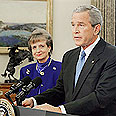
Qualified woman. President Bush with Harriet Miers
צילום: איי פי
To choose a judge
The American system of nominating judges isn't so bad
Many Israelis failed to grasp the images that blared across front-pages throughout America: Harriet Miers, President Bush's nominee to the Supreme Court, meeting with Senator Sam Brownbeck, trying to convince the powerful Republican to support her candidacy.
"She's a serious, qualified woman," said Brownbeck, "But I'm still not convinced she's the right candidate for the job."
Nominating a Supreme Court justice is one of the most important and most influential duties an American president has.
A Supreme Court appointment is an appointment for life, and judges have total authority to decide critical matters that affect the daily life of the nation.
During the last presidential campaign, a majority of voters said the most important issue for them when deciding who to vote for was "moral standing" on questions such as abortion and same-sex marriage.
With respect to these questions, Harriet Miers will have much more influence on American life than George W. Bush.
Miers was Bush's personal attorney as the governor of Texas, and worked on his campaigns for that office.
Despite this, the president's voting base is concerned Miers may not be conservative enough for their taste.
Many people are quick to cite the precedent of the late Chief Justice Earl Warren, nominated by President Dwight Eisenhower because of his impeccable conservative qualifications.
Warren turned out to be the bedrock of a liberal, and court, and Eisenhower called the nomination "my biggest mistake."
A judge running after politicians? A Supreme Court justice who's a personal friend, advisor and political ally of the president?
How far it is from an Israeli system that tries to be as objective as possible: a half-hidden nominating committee, near anonymity of the candidates, attempts to hide all hints of their personal political opinions or connections.
Comparing notes
But is the American model really so bad? Is it really so terrible that Miers' opinions and connections are well-known, as opposed the supposition that judges have no opinions or personal feelings or political connections that forms the base of the Israeli model?
Does not a confirmation process that requires parliamentary investigation and criticism create an atmosphere of transparency and encourage real public debate?
Here in Israel, we occasionally hear stories of personal politics affecting judicial nominations board – you vote for my guy now, and I'll vote for your guy later.
There is one, major difference, though, and it falls completely in favor of the Americans: There, the whole process is conducted out in the open, and there is lively debate in the media and public spheres.
Israeli values... or lack thereof
This difference touches on something even deeper: values play no part in Israel's political culture. If Ariel Sharon – or Ehud Barak or Benjamin Netanyahu, for that matter – were to nominate judges based on their own personal values, how would they choose?
No one has ever asked any of them where they stand on such issues as individual rights, the makeup of Israel's civil society, or any other important issues.
In Israel, "politics" means the West Bank and security.
It is no wonder then that when choosing Supreme Court justices we prefer to hide behind the myth of professional objectivity, which needlessly covers up indifference.










